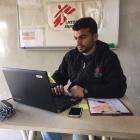Through these partnerships, we carried out water and sanitation activities, including the provision of toilets and showers, and distributed relief items, such as hygiene kits, tents, tarpaulins, warm clothing, blankets, nappies, jerry cans and firewood, as well as drinking water and food. Our teams helped construct shelters, which served as essential spaces for people to receive psychosocial support and access hygiene facilities.
Mental health support was a key component of our intervention. In collaboration with our partner organizations, we offered psychological support to families of victims, first-response volunteers, Syrian refugees, and search and rescue teams.
By the end of May, the most acute needs had been largely met, and we handed over the majority of our activities, while continuing to provide remote support to local organizations for the rest of the year.










